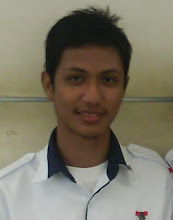Tuesday, September 29, 2009
cINtA
Posted by wAN at 4:18 AM 0 comments
Monday, September 21, 2009
aPE itU kAWAN???
Posted by wAN at 1:06 AM 0 comments
The Meaning of a Friends
Someone turned to me and asked
"How many friends have you?"
Why 10 or 20 friends I believe
And began to named a few...
A blessed one you are
To have so many friends
But think of what you're saying...
A friend is just not someone
To whom you say "Hello"
A friend is a tender shoulder
On which to softly cry
A well to pour your troubles down
And raise your spirits high
A friend is a hand to pull you up
From darkness and despair...
When all your other "so called" friends
Have helped to put you there
A true friend is an ally
Who can't be moved or bought
A voice to keep your name alive
When others have forgot
But most of all a friend has a true heart
For from the hearts of friends
There comes the greatest love of all!
So think about all this
For every word is true
And once again answer please...
How many friends have you?
After much thought I answered
I really only have just one
"It's You!"
A Friend Is Always Special
Because Friends Love You
Just Because You're You!
crEAtEd by:
Posted by wAN at 12:42 AM 2 comments
Saturday, September 19, 2009
lOvE u my frENzz

I can't give solutions to all of life's problems, doubts,
Posted by wAN at 11:47 PM 0 comments
wHAt iS mEDiCAL LAb tECHnoLOgy

mEdiCAL LAb tECHnology ( scIEntist )
- Perform sophisticated laboratory tests that help diagnose and treat disease
- Use complex instruments and electronic equipment
- Ensure test results are accurate
- Work independently but as an essential part of the health care team
Clinical laboratory personnel examine and analyze body fluids, and cells. They look for bacteria, parasites, and other microorganisms; analyze the chemical content of fluids; match blood for transfusions; and test for drug levels in the blood that show how a patient is responding to treatment. Technologists also prepare specimens for examination, count cells, and look for abnormal cells in blood and body fluids. They use microscopes, cell counters, and other sophisticated laboratory equipment. They also use automated equipment and computerized instruments capable of performing a number of tests simultaneously. After testing and examining a specimen, they analyze the results and relay them to physicians.
With increasing automation and the use of computer technology, the work of technologists and technicians has become less hands-on and more analytical. The complexity of tests performed, the level of judgment needed, and the amount of responsibility workers assume depend largely on the amount of education and experience they have. Clinical laboratory technologists usually do more complex tasks than clinical laboratory technicians do.
Clinical laboratory technologistsperform complex chemical, biological, hematological, immunologic, microscopic, and bacteriological tests. Technologists microscopically examine blood and other body fluids. They make cultures of body fluid and tissue samples, to determine the presence of bacteria, fungi, parasites, or other microorganisms. Technologists analyze samples for chemical content or a chemical reaction and determine concentrations of compounds such as blood glucose and cholesterol levels. They also type and cross match blood samples for transfusions.
Clinical laboratory technologists evaluate test results, develop and modify procedures, and establish and monitor programs, to ensure the accuracy of tests. Some technologists supervise clinical laboratory technicians.
Technologists in small laboratories perform many types of tests, whereas those in large laboratories generally specialize. Clinical chemistry technologists, for example, prepare specimens and analyze the chemical and hormonal contents of body fluids. Microbiology technologists examine and identify bacteria and other microorganisms. Blood bank technologists, or immunohematology technologists, collect, type, and prepare blood and its components for transfusions. Immunology technologists examine elements of the human immune system and its response to foreign bodies. Cytotechnologists prepare slides of body cells and examine these cells microscopically for abnormalities that may signal the beginning of a cancerous growth. Molecular biology technologists perform complex protein and nucleic acid testing on cell samples.
Clinical laboratory techniciansperform less complex tests and laboratory procedures than technologists do. Technicians may prepare specimens and operate automated analyzers, for example, or they may perform manual tests in accordance with detailed instructions. They usually work under the supervision of medical and clinical laboratory technologists or laboratory managers. Like technologists, clinical laboratory technicians may work in several areas of the clinical laboratory or specialize in just one. Phlebotomists collect blood samples, for example, and histotechnicians cut and stain tissue specimens for microscopic examination by pathologists.
Work environment.Clinical laboratory personnel are trained to work with infectious specimens. When proper methods of infection control and sterilization are followed, few hazards exist. Protective masks, gloves, and goggles often are necessary to ensure the safety of laboratory personnel.
Working conditions vary with the size and type of employment setting. Laboratories usually are well lighted and clean; however, specimens, solutions, and reagents used in the laboratory sometimes produce fumes. Laboratory workers may spend a great deal of time on their feet.
Hours of clinical laboratory technologists and technicians vary with the size and type of employment setting. In large hospitals or in independent laboratories that operate continuously, personnel usually work the day, evening, or night shift and may work weekends and holidays. Laboratory personnel in small facilities may work on rotating shifts, rather than on a regular shift. In some facilities, laboratory personnel are on call several nights a week or on weekends, in case of an emergency.
Posted by wAN at 9:49 PM 0 comments









